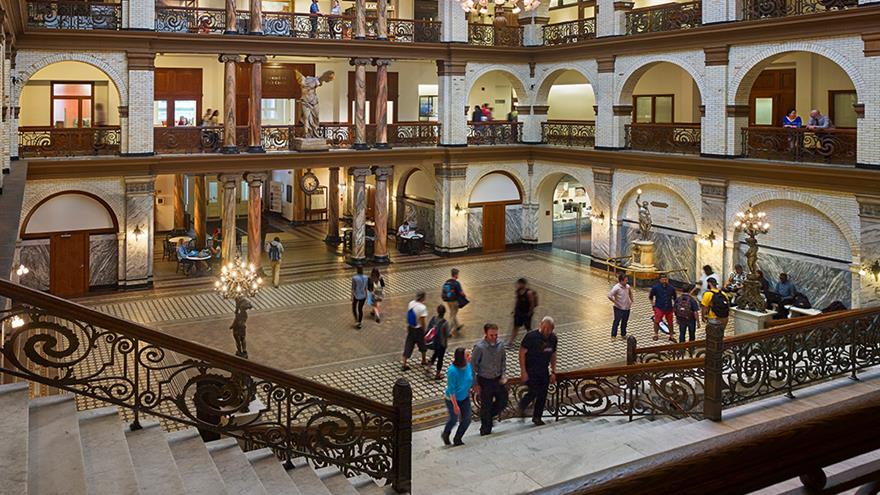Global Classrooms: How to Engage With International Institutions on Campus

Since 2013, the Office of International Programs’ Global Classrooms initiative has helped support the development of about 40 courses in which over 800 Drexel students worked with more than 700 students in universities around the world while still remaining on campus. That’s an extraordinary benefit for students who don’t have the financial or time budget to study abroad and professors who want to expand their international research.
According to Adam Zahn, program manager in the Office of International Programs, about 30 or more Global Classrooms will be set up this year in various disciplines including business, nursing, medicine, modern languages, education, civil engineering and psychology. This year, even more students are expected to benefit from this program than ever before.
“Of course, the Office of International Programs would like every Drexel student to have an international experience by studying abroad or doing co-op, research or service abroad, but we also recognize that some students may not be able to fit such opportunities into their curriculum or may need to begin with an in-class experience,” said Zahn. “Global Classrooms are a great way to spur their interests, providing opportunities for intellectual and cultural exchange with students from across the globe.”
Drexel faculty members receive funding and assistance from the Office of International Programs to develop a course and find an institution abroad to work with. Once the course begins, technologies like Blackboard Learn or various forms of social media are used to connect the students for classroom work and projects.
In some cases, Drexel students can meet the international students in person that they worked with online during the course. For example, Drexel students in the Spanish IV class taught by Maria de la luz Matus-Mendoza, PhD, director of modern languages and associate professor in the College of Arts and Sciences, hosted Chilean students at Drexel’s English Language Center after they’d spent weeks conversing in both English and Spanish.
“The Drexel students felt that their Spanish really improved by having the opportunity to speak more casually outside the walls of the classroom with their Chilean counterparts and the Chilean students reported the same,” said Zahn.
Currently, LeBow College of Business’ Dana D’Angelo, a clinical professor, and Jodi Cataline, an associate clinical professor, are expanding their ongoing Global Classrooms course with partners in the University of Leeds by adding a face-to-face component. Drexel and Leeds students will be brought together during the intersession following their course.
That type of “face-to-face” meeting is an excellent opportunity for students to extend their interactions with their international partners and gain a short-term study abroad. This is not a required component for all Global Classroom courses, but an option that faculty might develop together with the Office of International Programs and Drexel’s Study Abroad Office.
Faculty members are supported in every step of developing a Global Classroom. After they attend information sessions and workshops hosted by the Office of International Programs, they then work with Zahn to plan out the course.
“The process of developing a Global Classroom might look different for every faculty member,” he said. “Some come to me with both an idea and a partner in mind — and others are starting from scratch.”
For the latter scenario, Zahn will work with the faculty member to discuss project ideas for their course, suggest collaborators from Drexel’s network of over 90 international partner universities and develop a plan for action. He’ll also reach out to those international partners, facilitate introductions between faculty members and help the Global Classroom take shape.
Once the class is finished, Zahn assesses the course through Drexel’s standard course evaluation survey. This year, he will also help with a new assessment, called “Global Perspective Inventory,” given before and after the course to assess the individual learning experiences and development of global perspectives.
“We wanted to create a program that would provide the infrastructure and network support necessary to encourage all Drexel faculty members to incorporate Global Classroom elements into their existing classes,” said Zahn.
The Global Classrooms project is a great way to enhance Drexel’s global impact, which is a strategic initiative set forth by the University. By pairing students and faculty with a partner institution abroad, the initiative strengthens Drexel’s international influence and reputation while helping its Dragons explore their respective disciplines from a global perspective.
“This program has become ‘distinctly Drexel,’ in that we are one of the few universities globally engaging students in this type of manner,” said Zahn. “We are excited to see the program continue to blossom and hope it will become a hallmark of the Drexel student’s experience.”
Zahn is working to ensure that it does. Having presented at the State University of New York’s Collaborative Online International Learning (COIL) Conference last April, he will be presenting on Drexel’s Global Classroom at the first-ever European COIL Conference at the Hague University of Applied Sciences this December. Of course, when he’s abroad, he plans to foster collaborations with even more international partners for future Drexel Global Classrooms.
For a list of previous and current Global Classrooms, click here.
In This Article
Drexel News is produced by
University Marketing and Communications.

